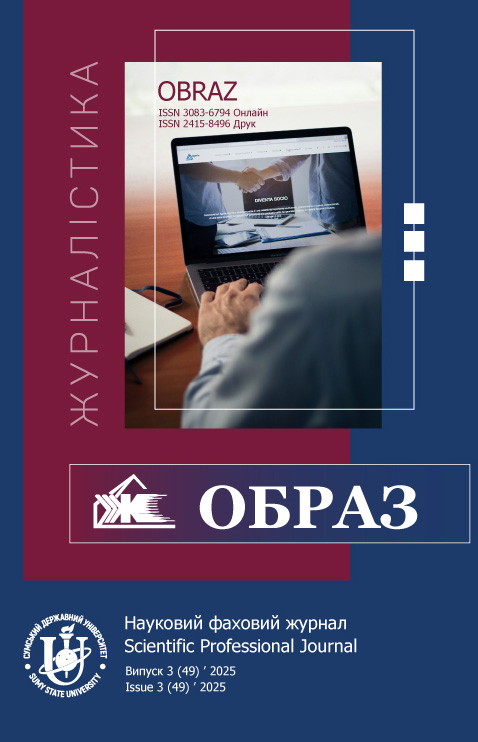Abstract
Introduction. The nuclear rhetoric of the official Kremlin is well-studied, but little attention has been paid to the rhetoric of Russian propagandists, as well as its dynamics. The connections between official rhetoric and the rhetoric of propagandists who pretend to be independent voices from the Kremlin remain unclear.
Relevance and purpose. Studying the topic will allow us to understand what communicative strategies and techniques the enemy uses in its information war, the role of individual propagandists who try to justify a possible nuclear strike, as well as the specifics of Russian propaganda, which is revealed as a result of the analysis of the specified case. The purpose of the study: to establish the presence or absence of a connection between the official Kremlin nuclear rhetoric and the rhetoric of propagandists and, based on the analysis, to identify the features of modern Russian propaganda.
Methodology. For the research Telegram channels of the most popular Russian propagandists (Soloviev, Zakharova, Voenkor Kotyonok) were studied. The RE module (Python language) was used to search for mentions and collocations, and the Spacy library was used to identify the most popular topics.
The results. The study showed that, the rherorics depends on the situation on the front. Attention to this topic was constant throughout all three years, with more mentions in 2022. Propagandists voiced and detailed statements made at the official level in the Kremlin.
Conclusions. It was found that the “nuclear theme” or “nuclear threats” is one of the key themes of modern Russian propaganda. Russian propagandists worked in a coordinated manner: increasing or decreasing attention to the topic, in accordance with the official Kremlin rhetoric. This allows us to conclude that modern Kremlin propaganda corresponds to the ideas about “humanitarian/political technologies” that were widespread in the 80s-90s in the USSR, and then in the early years of the Russian Federation. An important feature of modern Russian propaganda is not only the repetition of Kremlin messages, but also their interpretation, clarification for a wider audience, where each propagandist played his role during the dissemination of “nuclear threats” - to imitate a supposedly independent voice and work in the interests of his audience.
References
1. AL Jazeera (2025). No other option’: Excerpts of Putin’s speech declaring war. URL: https://www.aljazeera.com/news/2022/2/24/putins-speech-declaring-war-on-ukraine-translated-excerpts (accessed: 28.06.2025).
2. GCSP (2022). The War in Ukraine and Nuclear Weapons: What Should We Fear? URL: https://www.gcsp.ch/global-insights/war-ukraine-and-nuclear-weapons-what-should-we-fear (accessed: 28.06.2025).
3. Bollfrass, A. K., Herzog, S. (2022) The War in Ukraine and Global Nuclear Order. Survival, 64(4), 7–32. URL: https://doi.org/10.1080/00396338.2022.2103255 (accessed: 28.06.2025).
4. Wachs, L. (2023). Russian nuclear roulette? Elites and public debates on nuclear weapons in Moscow after Ukraine. The Nonproliferation Review, 30(4–6), 173–196. URL: https://doi.org/10.1080/10736700.2024.2435706 (accessed: 28.06.2025).
5. Arndt, A. C., Horovitz, L., & Onderco, M. (2023). Russia’s Failed Nuclear Coercion Against Ukraine. The Washington Quarterly, 46(3), 167–184. URL:https://doi.org/10.1080/0163660X.2023.2259665 (accessed: 28.06.2025).
6. Nitza-Makowska, A. (2024). Russia’s Aggression against Ukraine and South Asia: What Are the Implications of Moscow’s Nuclear Blackmail for India and Pakistan? Przegląd Strategiczny. 17. 77–90. URL: https://doi.org/10.14746/ps.2024.1.5 (accessed: 28.06.2025).
7. Zahid, M. (2024). Contemporary Perspectives On The Nuclear Dimension Of The Russia-Ukraine War. BTTN Journal. 3(2). 202–222.
8. Yoak, E. (2023). Classical Realism and Ukraine: Constructing the Causes. European Journal of Law and Political Science. 2023. 2(2). 29–35. URL: https://doi.org/10.24018/ejpolitics.2023.2.2.73 (accessed: 28.06.2025).
9. Steblyna N. Yaderna isteryka Kremlya: vid “udaru po Londonu” do vymoh zupynyty “atomne zhaxittya”. Pylyp Orlyk Institute for Democracy. URL: https://idpo.org.ua/analitics/5265-yaderna-isterika-kremlya.html (accessed: 28.06.2025).
10. Striha M. Ohlyad vidpovidi ukrayins’koho ekspertnoho seredovyshha na vypadky dezinformaciyi v sferi yadernoyi enerhiyi / M. V. Strixa, I, M. Ivanyshyn, B. M. Oleksyuk ; Akad. nauk vyshh. shkoly Ukrayiny. Kyiv: Lira-K, 2023. 59 p.
11. Ekspedyciya ХХІ. URL: https://expedicia.org/pro-nas/ (accessed: 28.06.2025).
12. Ukrinform. (2023). Ukrayins’ka vidpovid’ na rosijs’ki yaderni fejky. URL: https://www.ukrinform.ua/rubric-presshall/3674070-ukrainska-vidpovid-na-rosijski-aderni-fejki.html?utm_source=chatgpt.com (accessed: 28.06.2025).
13. Ekspedyciya (2024). U Kyyevi prezentuvaly knyzhku pro reakciyu ekspertiv na rosijs’ku dezinformaciyu u yadernij sferi Ukrayiny. URL: https://expedicia.org/u-kiievi-prezentuvali-knizhku-pro-reakc/ (accessed: 28.06.2025).
14. NAN Ukrayuny. (2022) Zaklykayemo mizhnarodnu spil’notu poklasty kraj rosijs’komu yadernomu teroryzmu. URL: https://old.nas.gov.ua/UA/Messages/news/Pages/View.aspx?MessageID=9359 (accessed: 28.06.2025).
15. Steblyna, N. (2023). The Dynamics of Hate Speech Spreading on the Telegram-channels of the Popular Kremlin Propagandists. Obraz. 2(42). 17–24.
16. Denysenko, V. & Pyrovych V. Postputin. Rosiya, z yakoyu nam dovedet’sya zhyty nastupni 50 rokiv. Kyiv: Nash format, 2025. 240 p.
17. 77% of Russians support the actions of the occupiers in Ukraine, and 34% approve of a nuclear strike: poll. ZMINA. URL: https://zmina.info/news/77-rosiyan-pidtrymuyut-diyi-okupantiv-v-ukrayini-a-takozh-34-shvalyuyut-yadernyj-udar-opytuvannya/ (accessed: 28.06.2025).
18. Horovitz L., Stolze A.C. Nuclear rhetoric and escalation management in Russia’s war against Ukraine: A chronology. German Institute for International and Security Affairs 2023. URL: https://doi.org/10.7802/2533 (accessed: 28.06.2025).
19. Pomerantsev P., & Weis M. (2014). The Menace of Unreality: How the Kremlin Weaponizes Information, Culture and Money. The Institute of Modern Russia, 2014. URL: https://imrussia.org/media/pdf/Research/Michael_Weiss_and_Peter_Pomerantsev__The_Menace_of_Unreality.pdf (accessed: 28.06.2025).
20. Laruelle M. (2024). Russia’s Ideological Construction in the Context of the War in Ukraine. The French Institute of International Relations. URL: https://www.ifri.org/sites/default/files/migrated_files/documents/atoms/files/ifri_laruelle_russia_ideology_2024.pdf (accessed: 28.06.2025).

This work is licensed under a Creative Commons Attribution 4.0 International License.

